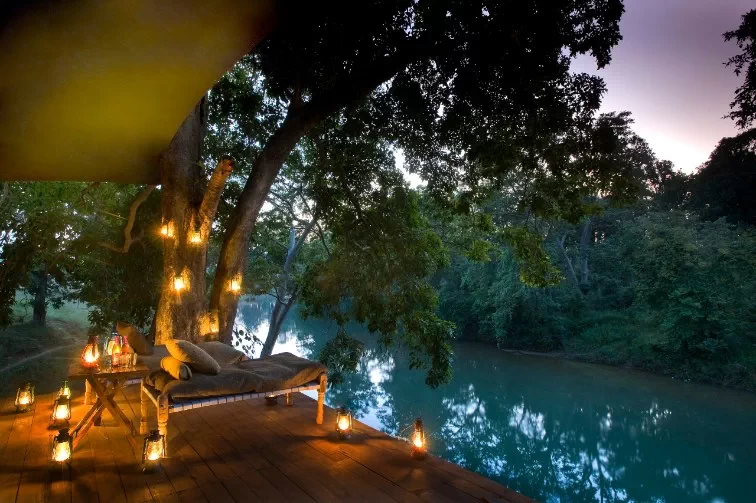Responsible/Sustainable Tourism
Kipling Camp has been closely associated with the local community for the past 40 years. When the Wright Family first got to know Kanha in the early 1970s, the region was extremely impoverished, with no infrastructure, no electricity, no communication, and no access to education or medical assistance. Wildlife tourism barely existed and the family vowed – long before these became buzz words – to create a destination that had low-impact on the environment and which was responsible and sustainable, and to employ and assist the local people in whatever way possible along with gently engaging and educating guests on wildlife conservation and local cultural issues. The Camp follows a Code of Conduct, that includes waste disposal, how any construction and repairs are carried out, noise levels, the use of wood, electricity and plastic and waste management and water use is taken particularly seriously. In October 2019, the lodge hosted a workshop for wildlife resorts in the area on these very topics.
All the staff except for the Head Naturalist, are locals who have been trained – many of them have been with Kipling Camp for over 30 years. Over the years, Kipling Camp has supported the local community with numerous specific needs, including marriages and funerals, and medical emergencies. Two local schools are continuously supported and are furnished, repaired and supplied with essentials including a football pitch. At the start of winter, clothes and new blankets are distributed in the tribal villages in the area and support is given to medical camps when set up. The lodge supports the making and distribution of inexpensive and organic, washable and re-usable menstruation pads for local women and girls.
The Baiga tribals were supported by the lodge to set up a cooperative. They now put on daily dance performances at the National Park’s Interpretation Centre, and perform at Kipling Camp and other wildlife resorts and hotels around Kanha. Talented Gond artists are assisted with art supplies and to sell their paintings at a fair price. The artists visit Kipling Camp regularly to display their paintings to visitors, and to tell people about their art and their animalistic beliefs and traditional stories. Guests can thus be reassured that purchases go directly to the artist.
Community support extended in helping a talented local villager – Pintu-bhai, to establish and expand his small organic native plant nursery, and now stocks over 80 species of native trees, along with medicinal plants, shrubs and fruit trees along with making rare and traditional organic compost, including Jeevamrut, Panchagavya, and Bael and Basma liquid, and jaivik keetnashak organic pesticide. Pintu-bhai now employs a number of local people to help with his nursery and every two or three months travels from Kanha to different parts of India to give talks about native plants and traditional compost.
In 1994, Belinda set up the Wildlife Protection Society of India (WPSI), in a conservation awareness programme that reaches out to the hundreds of villages that surround Kanha Tiger Reserve. A team of two, who are based at Kipling Camp, use a modified, tiger-themed, audio-visual van to systematically visit every village that fringes the Reserve. The aim is to encourage local stewardship for wildlife and to motivate people towards tiger protection, and also to spread word of the programme’s anti-poaching reward scheme.
The buildings on the property have been constructed using the local style of architecture, and with minimum use of cement – the objective was to creare a wildlife resort that fit seamlessly and sensitively into the landscape. The architecture uses the traditional local design, with cottages scattered among the trees. There are no formal gardens and even the paths are small tracks through the forest, that are lit up by solar motion-sensor lights at night. The intangible heritage associated with Kipling Camp is the long history of the Wright family with this region. Anne Wright, Belinda’s mother, was brought up in the area in the early 1930s, the daughter of an ICS officer. Belinda spent much of her early years as a professional wildlife photographer with National Geographic, and later as a wildlife filmmaker, working in Kanha National Park since the early 1970s. The property was originally a treeless patch of agricultural land, surrounded by jungle. In the centre, there was a huge man-made mud ‘bund’ for water. Today, this land has a thicker forest and a richer canopy than the surrounding Reserve Forest. The bund has been re-contoured and deepened for rainwater harvesting, and it has become a favourite waterhole of the wildlife in the area. The property is unfenced and surrounded by jungle. Only a small portion is used for the resort while the rest is maintained as a sanctuary for the wildlife. Once the hot summer peaks in late April the resort is closed, so the wildlife can use the waterhole completely undisturbed.









